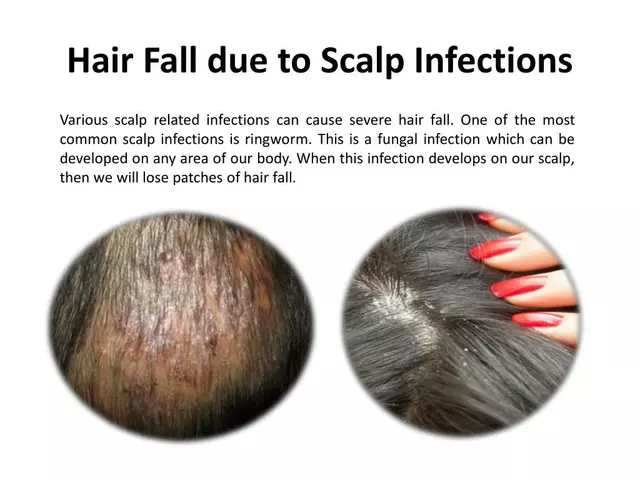Understanding Ringworm and its Effects on Hair Loss
As a blogger who's been exploring the world of hair health and hair loss, I've come across a fascinating connection between ringworm and hair loss. Ringworm is a common fungal infection that affects the skin, nails, and hair. It can lead to a variety of symptoms, including hair loss. In this article, I will discuss the connection between ringworm and hair loss, as well as what you should know to protect your hair and maintain its health. So without further ado, let's dive into the world of ringworm and hair loss!
Identifying Ringworm: Symptoms and Causes
Before we explore the connection between ringworm and hair loss, it's essential to understand what ringworm is and what causes it. Ringworm is a skin infection caused by a group of fungi called dermatophytes. These fungi live on the skin's surface and feed on keratin, a protein found in skin, hair, and nails. Ringworm can affect various parts of the body, but when it appears on the scalp, it can cause hair loss.
Some common symptoms of ringworm include:
- Red, scaly, and itchy patches on the skin
- Raised, ring-shaped lesions with a clear center
- Brittle and broken hair
- Discolored and thickened nails
- Bald patches on the scalp
Ringworm is highly contagious and can be easily spread through direct contact with an infected person or animal, or indirectly through contaminated objects like towels, combs, or bedding.
How Ringworm Leads to Hair Loss
Now that we have a better understanding of what ringworm is let's discuss how it can lead to hair loss. When the fungi responsible for ringworm infect the scalp, they invade hair follicles and weaken the hair shafts. As a result, the infected hair becomes brittle and breaks off easily, leaving behind bald patches on the scalp. If left untreated, ringworm can cause permanent hair loss due to damage to the hair follicles.
Diagnosing Ringworm and Hair Loss
If you suspect that you have ringworm and are experiencing hair loss, it's crucial to consult a healthcare professional for a proper diagnosis. A dermatologist or a general practitioner can diagnose ringworm by examining the affected area and taking a skin or hair sample for laboratory testing. This is important because other conditions, such as alopecia areata or psoriasis, can also cause hair loss and may require different treatments.
Treating Ringworm to Prevent Hair Loss
Once a diagnosis of ringworm has been confirmed, it's essential to start treatment as soon as possible to prevent further hair loss and help the hair regrow. Treatment for ringworm typically involves the use of antifungal medications, which can be applied topically or taken orally, depending on the severity of the infection. These medications help to kill the fungi and prevent them from spreading, allowing the hair to regrow in the affected areas.
In addition to antifungal medications, you can also take steps to promote hair regrowth and prevent future infections:
- Keep your scalp clean and dry
- Avoid sharing personal items like combs, brushes, and towels
- Wash your hands regularly, especially after coming into contact with an infected person or animal
- Treat any other fungal infections on your body to prevent the spread of ringworm to your scalp
Home Remedies for Ringworm and Hair Loss
While medical treatment is essential for effectively treating ringworm and promoting hair regrowth, some home remedies may help alleviate symptoms and support the healing process. These remedies should be used in conjunction with prescribed antifungal medications, and it's always best to consult your healthcare professional before trying any new treatments.
Some popular home remedies for ringworm and hair loss include:
- Applying tea tree oil, which has antifungal properties, to the affected areas
- Using a shampoo containing selenium sulfide or ketoconazole, both of which have antifungal properties
- Applying a paste of crushed garlic cloves to the affected areas
- Consuming probiotics to support your body's natural defense against fungal infections
Preventing Ringworm and Hair Loss in the Future
The best way to prevent ringworm and subsequent hair loss is to take steps to reduce your risk of infection. Here are some tips for keeping your scalp healthy and preventing future ringworm infections:
- Practice good hygiene by washing your hair and scalp regularly
- Keep your hair and scalp dry, as fungi thrive in moist environments
- Avoid sharing personal items like combs, brushes, and towels
- Be cautious when using public facilities like gyms and pools, where ringworm can spread easily
- Treat any other fungal infections on your body promptly to prevent the spread of ringworm to your scalp
By following these tips and seeking prompt treatment for ringworm, you can help protect your hair and maintain its health in the long run.



Donna Oberg
May 21, 2023 AT 01:20Oh my gosh!!! Ringworm on the scalp? That's a nightmare!!!
Garreth Collard
May 21, 2023 AT 18:00Indeed, the sheer audacity of a fungus daring to steal your crowning glory is nothing short of theatrical tragedy-one that demands a swift, heroic interdiction. While many dismiss it as a trivial skin annoyance, the cascade of follicular damage it initiates can rival the most dramatic of alopecia sagas.
Daniel LaMontagne
May 22, 2023 AT 10:40Totally get you, Garreth! 😅 The key is catching it early-once the spores embed in the follicle, they’re harder to evict. A good antifungal shampoo coupled with a clean scalp can keep the drama at bay. 🌿
Gary Levy
May 23, 2023 AT 03:20From a broader perspective, it's fascinating how a microscopic organism can exert such a macroscopic impact on our self‑image. Keeping the environment dry and avoiding shared grooming tools are simple yet often overlooked preventative steps.
sourabh kumar
May 23, 2023 AT 20:00yeah dont forget wash hands after pets and dont share combs they can spread it fast
Christian Miller
May 24, 2023 AT 12:40One must also consider the hidden agenda of pharmaceutical conglomerates. Their marketing of oral antifungals often masks the fact that many cases resolve with simple hygiene measures, yet they push expensive prescriptions to maintain profit streams.
NORMAND TRUDEL-HACHÉ
May 25, 2023 AT 05:20Honestly, most of this is common sense. Keep it clean, keep it dry, and use a proper shampoo.
AJIT SHARMA
May 25, 2023 AT 22:00These so‑called "expert" tips are just basic hygiene, nothing fancy.
Neber Laura
May 26, 2023 AT 14:40Stop feeding misinformation! The science is clear: antifungal treatments are essential, and neglecting them leads to permanent hair loss. Your casual attitude is dangerous.
Karen Nirupa
May 27, 2023 AT 07:20Dear community, it is my pleasure to remind everyone that cultural practices, such as communal bathing in certain regions, can inadvertently increase the risk of dermatophyte transmission. Therefore, it is incumbent upon us to promote respectful hygiene education while honoring diverse traditions.
Quinn Comprosky
May 28, 2023 AT 00:00The importance of early detection cannot be overstated; when a patient presents with isolated scalp lesions, a KOH preparation can swiftly confirm the presence of fungal hyphae, guiding targeted therapy. Moreover, the psychosocial impact of alopecia-even when temporary-demands compassionate counseling alongside medical treatment. In practice, combining topical agents like ketoconazole with systemic therapy for extensive cases yields superior outcomes. Consistent follow‑up ensures the infection has been fully eradicated and allows for monitoring of hair regrowth. Finally, patient education regarding avoidance of shared personal items remains a cornerstone of prevention.
Thomas Ruzzano
May 28, 2023 AT 16:40Listen up, folks! The so‑called "natural" remedies are cute, but they won’t save you from a full‑blown fungal invasion. If you want to keep your mane, grab a clinically proven antifungal shampoo and stop playing around.
Dan Tenaguillo Gil
May 29, 2023 AT 09:20When considering the broader context of dermatophyte infections, it becomes evident that a multidisciplinary approach yields the most sustainable outcomes. First, a thorough clinical examination must be paired with laboratory confirmation-such as a fungal culture or microscopic analysis-to distinguish ringworm from other alopecic conditions. Second, treatment protocols should be individualized: topical agents are ideal for localized lesions, whereas oral antifungals become indispensable for extensive scalp involvement. Third, patient education plays a pivotal role; instructing individuals on proper scalp hygiene, the dangers of sharing grooming tools, and environmental decontamination reduces recurrence risk. Additionally, one must address potential comorbidities, such as diabetes or immunosuppression, which can exacerbate fungal proliferation. Collaborative care involving dermatologists, primary care physicians, and, when appropriate, infectious disease specialists ensures comprehensive management. Follow‑up appointments are crucial to verify eradication and to monitor hair regrowth, offering reassurance and adjusting therapy as needed. Finally, community outreach programs can disseminate preventive measures, especially in schools and athletic facilities where transmission rates are heightened. By integrating these strategies-diagnostic rigor, tailored therapy, patient empowerment, and public health initiatives-we can effectively curb the impact of ringworm‑induced hair loss and promote lasting scalp health.